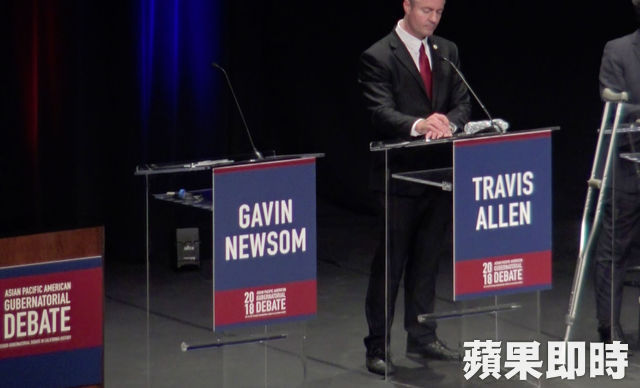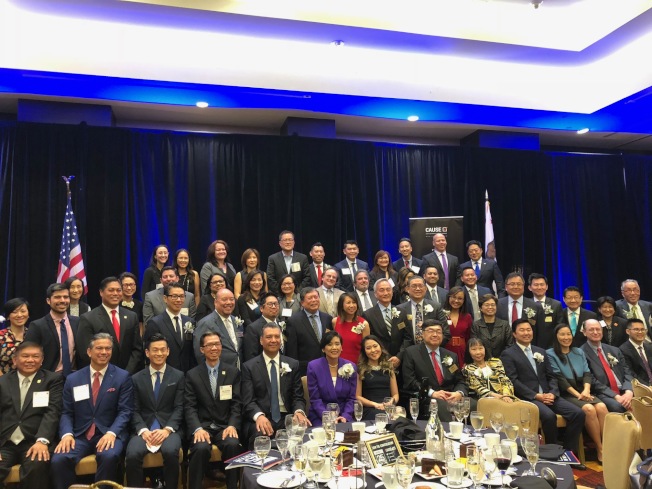By Eddie Rivera, Community Editor | Photography by James Carbone
Demonstrating the current polarization of the political scene, even in heavily Democratic California, boos erupted several times during Friday evening’s gubernatorial debate at Pasadena City College.
The first instance came when former Los Angeles Mayor Antonio Villaraigosa was introduced, and continued any time either of the Republican candidates, Travis Allen or John Cox, mentioned President Donald Trump by name.
Allen also referred to his Republican opponent, Cox, as a “slumlord,” and criticized Cox’ apartments “with the cockroaches, the rats, and the holes in the walls.” Cox called those criticisms “lies.”
Friday’s debate, which was attended by several hundred, was the first Asian Pacific American-facing gubernatorial debate in California history, and featured Republican Travis Allen, Democrat John Chiang, Republican John Cox, Democrat Delaine Eastin, and Democrat Villaraigosa.
Democrat Gavin Newsom did not attend the event. His office did return calls or emails from Pasadena Now.
The debate was moderated by Richard Lui, of KNBC-4, and Seema Mehta, of The Los Angeles Times. Questions centered around healthcare, housing, environment, language accessibility and education.
The group of candidates was a relatively accurate spectrum of political leanings with Cox and Allen—Republicans with little chance of winning the state—hewing closely to a conservative, anti-undocumented, and anti-tax stance, while candidates Chiang, Eastin and Villaraigosa supporting varying degrees of liberal and progressive positions.
As an example, asked about the importance of the Asian voting population, Allen said, that, if elected, he would institute a state voter ID program, “so that only California citizens can vote.”
Chiang praised the importance of the Asian-American voting community, and said they have a “chance to have a profound effect on the state and nation’s elections in the future.”
Asked about the hot-button immigration issue, both Cox and Allen stressed border security and crime, with Cox calling Mexico a “corrupt and out-of-control country,” while Eastin noted that half of California’s businesses have at least one immigrant as a founder. Villaraigosa pointed to a recent study by the American Academy of Science, which determined that undocumented immigrants commit less crime than native-born Americans.
“That’s a fact,” he said, adding, “Let’s celebrate the fact that immigrants are contributing to this country.”
On the question of Affirmative Action programs, Eastin said, “I believe in Affirmative Action for lower income students, for people who have special needs, and I believe that this state needs to make college education free for each and every California student. Let’s focus on helping every kid in this state have a brilliant future.”
Chiang agreed, and said, “California education has been dramatically underfunded. We need Affirmative Action so we make sure that people get into the private sector at the highest levels.”
Allen lamented the current quality of California’s education and noted that the system, once the nation’s best, is now in the bottom of the rankings.
“We must fix our education system,” he said, emphasizing school testing at all levels.
Cox criticized educational spending, saying that too much was spent on administrators and not in the classrooms.
‘I want to see teachers paid like rock stars and athletes, based on merit,” he said.
Addressing health care, both Allen and Cox railed against single-payer health care, with Allen saying the system would “bankrupt the state in the first six months,” and saying that he would “eliminate and replace Obamacare.”
Cox called for a “free market health care system and pricing transparency,” adding, “we need to take out the government and insurance companies.”
Asked about climate concerns and the U.S. relaxing a slew of environmental regulations, Chiang said, ‘I believe in Climate Change. I disagree with the president, who said that it’s a hoax, created by the Chinese. Climate change is real.” Chiang said he would work to create a state that was fossil fuel-free by 2045.
“We need to keep the air clean,” said Cox, “but we need to balance out the costs and the benefits.”
Eastin countered, “I believe in something called science. I not only believe in what Governor Jerry Brown is doing, but I will take it much further. The reality is that we absolutely have to reduce our carbon footprint in this state.”
Addressing the housing and homelessness issue, Cox, who worked in the construction industry, said he would streamline construction regulations and claimed to have a plan to build three million homes in California over the next ten years, though he did not offer details. His remarks on housing prompted the attack from Allen.
Meanwhile, Eastin declared, “We need a full court press to make sure we’re building homes close to transit hubs,”, while Villaraigosa acknowledged that the cost of housing is the reason why California has the largest number of homeless in the country, and outlined a wide-ranging plan which included transit-oriented districts, “granny flats,” and housing trust funds.
While Newsom has made several trips to Southern California, including Pasadena, for fundraising, one local political insider posited Friday that Newsom would likely not make any Southern California debate appearances “until after June.”
The California Gubernatorial election is scheduled for November 6, 2018.
































